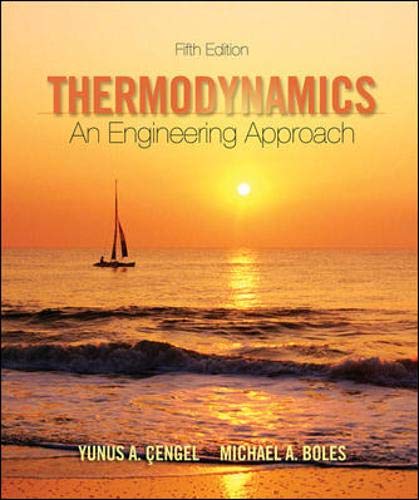Inhaltsangabe:
The worldwide bestseller
Thermodynamics: An Engineering Approach brings further refinement to an approach that emphasizes a physical understanding of the fundamental concepts of thermodynamics. The authors offer an engineering textbook that "talks directly to tomorrow's engineers in a simple yet precise manner, that encourages creative thinking, and is read by the students with interest and enthusiasm."
The new edition features an early introduction of the first law of thermodynamics, separate coverage of closed systems energy analysis, combined coverage of control volume mass and energy analysis, and revised coverage of compressible flow. Over 300 comprehensive problems have been added to this physically intuitive text, many of which come from industrial applications.
The media package for this text is extensive, giving users a large variety of supplemental resources to choose from. A Student Resources DVD is packaged with each new copy of the text and contains the popular Engineering Equation Solver (EES) software, Physical Experiments, and an Interactive Thermodynamics tutorial. An Online Learning Center is also available to students and instructors at http://www.mhhe.com/cengel. Instructors also have access to an Instructor Resource CD-ROM that provides useful tools in order to optimize in-class presentations.
Yunus A. ï¿engel is Professor Emeritus of Mechanical Engineering at the University of Nevada, Reno. He received his B.S. in mechanical engineering from Istanbul Technical University and his M.S. and Ph.D. in mechanical engineering from North Carolina State University. His areas of interest are renewable energy, energy efficiency, energy policies, heat transfer enhancement, and engineering education. He served as the director of the Industrial Assessment Center (IAC) at the University of Nevada, Reno, from 1996 to 2000. He has led teams of engineering students to numerous manufacturing facilities in Northern Nevada and California to perform industrial assessments, and has prepared energy conservation, waste minimization, and productivity enhancement reports for them. He has also served as an advisor for various government organizations and corporations. Dr. ï¿engel is also the author or coauthor of the widely adopted textbooks Differential Equations for Engineers and Scientists (2013), Fundamentals of Thermal-Fluid Sciences (5th ed., 2017), Fluid Mechanics: Fundamentals and Applications (4th ed., 2018), Thermodynamics: An Engineering Approach (9th ed., 2019), and Heat and Mass Transfer: Fundamentals and Applications (6th ed., 2020), and all published by McGraw-Hill Education. Some of his textbooks have been translated into Chinese (Long and Short Forms), Japanese, Korean, Spanish, French, Portuguese, Italian, Turkish, Greek, Tai, and Basq. Dr. ï¿engel is the recipient of several outstanding teacher awards, and he has received the ASEE Meriam/Wiley Distinguished Author Award for excellence in authorship in 1992 and again in 2000. Dr. ï¿engel is a registered Professional Engineer in the State of Nevada, and is a member of the American Society of Mechanical Engineers (ASME) and the American Society for Engineering Education (ASEE).
New Page 1 Michael A. Boles is Associate Professor of Mechanical and Aerospace Engineering at North Carolina State University (NCSU), where he earned his Ph.D. in mechanical engineering and is an Alumni Distinguished Professor. Dr. Boles has received numerous awards and citations for excellence as an engineering educator. He is a past recipient of the SAE Ralph R. Teetor Education Award and has been twice elected to the NCSU Academy of Outstanding Teachers. The NCSU ASME student section has consistently recognized him as the outstanding teacher of the year and the faculty member having the most impact on mechanical engineering students. Dr. Boles specializes in heat transfer and has been involved in the analytical and numerical solution of phase change and drying of porous media. He is a member of the American Society of Mechanical Engineers, the American Society for Engineering Education, and Sigma Xi. Dr. Boles received the ASEE Meriam/Wiley Distinguished Author Award in 1992 for excellence in authorship.
„Über diesen Titel“ kann sich auf eine andere Ausgabe dieses Titels beziehen.
![]()
